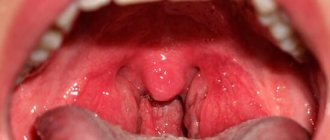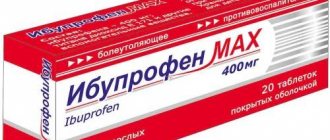Symptoms of pharyngitis in adults
This diagnosis implies inflammation of the middle part of the pharynx, but often, especially at the acute stage, the upper and lower parts are involved in the pathological process. In addition, the tonsils may become inflamed (tonsillitis). When transitioning to a chronic form, the focus is usually clearly localized. The presence and severity of certain signs of the inflammatory process depend on the form and stage of the disease.
Acute pharyngitis
There may be several causes of pharyngitis in adults. It develops most often under the influence of aggressive external factors (inhalation of polluted or too cold air, smoking) or as a result of tissue infection by bacteria and viruses. The acute stage of the disease is characterized by a diffuse course, involving all three parts of the pharynx and characteristic symptoms:
- dryness, burning and sore throat, causing dry cough with pharyngitis;
- the mucous membrane is hyperemic, in places covered with purulent plaque, the palatine arches and uvula are swollen;
- swallowing is accompanied by pain, especially with the so-called “empty throat”;
- enlargement of lymph nodes (cervical and submandibular) and their soreness;
- nasal congestion and rhinitis (inflammation of the upper pharynx).
Photo of the throat of a patient with pharyngitis.
The general condition practically does not worsen; the temperature with pharyngitis in adults does not increase or is within subfebrile values.
Chronic pharyngitis
If pharyngitis becomes chronic, then the symptoms at the exacerbation stage depend on the specific form of the disease:
- Catarrhal. The thickened and hyperemic mucosa is covered with viscous discharge. Patients complain of rawness and sore throat and often clear their throat. Pain when swallowing is moderate.
- Hypertrophic. In addition to redness and swelling of the mucous membranes, proliferation of lymphoid tissue is observed. The cough with pharyngitis of this type is expectorant, worsening in the morning until vomiting due to the accumulation of mucus in the throat. The pain is moderate.
- Atrophic. The mucous membranes are dry and shiny (“lacquered”), pale, covered in places with crusts and mucus. The patient is bothered by a dry cough, soreness and burning sensation in the throat.
There is usually no significant deterioration in the general condition, but constant discomfort, nasal congestion and cough with pharyngitis lead to irritability, lack of sleep and decreased quality of life.
Treatment of pharyngitis in adults at home
The inflammatory process is the body's reaction to some irritating factors. From the perspective of traditional medicine, when thinking about how to treat pharyngitis in adults, it is worth understanding what led to the development of an inflammatory disease of the pharyngeal mucosa. Identify the causes, eliminate the symptoms and cure - this is what the treatment of the throat at home in adults is aimed at. An effective scheme involves local exposure, in which various drugs and remedies will help: tablets, lozenges, sprays, inhalations, rinses, and decoctions.
Spicy
The peculiarity of this form of the disease is the combination of pharyngitis with other inflammatory diseases of the respiratory tract. If the first is the result of the development of a viral infection, then the second are often of bacterial or fungal origin. When diagnosing acute pharyngitis in adults, the general condition is assessed as satisfactory: a slight increase in temperature, pain when swallowing and an unpleasant sensation of tickling and burning. A characteristic symptom of the acute form of the disease is great discomfort when swallowing food and constant thirst.
How to treat chronic pharyngitis
How to treat this form of the disease? Only some symptoms of this type of inflammation of the pharyngeal mucosa are similar to the clinical signs of the disease. A different pharyngoscopy picture, which ultimately leads to a hypertrophic or atrophic form, does not cause an increase in temperature. In adults with chronic pharyngitis, health remains normal, only dryness, accumulation of viscous mucus and the sensation of a foreign body cause great discomfort. How to treat pharyngitis in an adult if the disease has become chronic?
Drug treatment of inflammation of the mucous membrane in adults includes: gargling with anti-inflammatory, antiseptic solutions, taking tablets and lozenges, treating the throat with a spray. An otolaryngologist will prescribe antibiotics for pharyngitis only in case of exacerbation of the chronic form of the disease. Taking a vitamin complex, a gentle diet, plenty of warm drinks, quitting smoking, alcohol, physiotherapeutic procedures - these are the factors that will help when the task is how to cure chronic pharyngitis quickly and without antibiotics.
Articles on the topic
- Eucalyptus for inhalation: application
- Paroxysmal cough - how to cure it at home with medications, inhalations and herbs
- Respiratory diseases: symptoms and treatment
Treatment of pharyngitis in adults - drugs, inhalations, folk remedies
Diseases of the upper respiratory tract require an integrated approach to treatment. First of all, the cause (for example, smoking or infection) is identified and eliminated. Symptomatic therapy is carried out to alleviate the condition, get rid of cough and relieve swelling. If the disease is the result of infection with viruses or bacteria, a course of appropriate medications is prescribed. Inhalations for pharyngitis and some proven folk remedies used at home are also useful.
Drug therapy
To treat bacterial and viral pharyngitis, systemic and local agents are used: antibiotics, antiseptics, mucolytics, anti-inflammatory and analgesic drugs. If the disease is of allergic origin, antihistamine medications are indicated. Medicines are prescribed in the form of tablets, aerosols, lozenges, lozenges, and gargles for pharyngitis.
Systemic drugs
If the inflammation is bacterial in nature, antibiotics include macrolides, penicillins and cephalosporins. Azithromycin, Amoxicillin, Cefixime and others are indicated in the form of tablets, suspensions and capsules for oral use. In case of severe course and complications (tonsillitis, laryngitis, etc.) - injection drugs Ceftriaxone, Cefoperazone. Mucolytics such as ACC are also used to thin the sputum, as well as antiviral (for viral pharyngitis) and immunostimulating agents.
Read further: In simple terms about antibiotics for pharyngitis in adults and children
Sprays
They are used topically, irrigate the throat well, and contain antiseptic, analgesic and anti-inflammatory components. The most effective sprays for pharyngitis:
- Tantum Verde
- Hexoral
- Ingalipt
- Kameton
Another effective drug, which was previously used only to lubricate the throat, is now available in aerosol form. Lugol spray for pharyngitis helps to quickly cope with painful symptoms and get rid of the infection.
Read further: The best throat sprays with antibiotics + prices + brief review
Lozenges
Like sprays, they contain various antimicrobial and anti-inflammatory components, anesthetics, and local immunostimulants. An additional therapeutic effect occurs due to hypersalivation during the resorption process: pathogenic microflora is washed away from the mucous membranes with a large amount of saliva. Recommended drugs: Trachisan, Lizobact, Gramicidin, Imudon.
Read further: Latest data on absorbable throat tablets with antibiotics
Rinse
Very often solutions such as Chlorhexidine, Rotocan, Chlorophyllipt, Furacilin are prescribed for pharyngitis. They have antiseptic properties and cope well with pathogenic microflora. Some are sold ready-made, while others must first be diluted with water or the dry drug dissolved in water (for example, Furacilin tablets).
Inhalations
This physiotherapeutic procedure provides an excellent therapeutic effect for respiratory diseases. Inhalation of fine particles of liquid and medicines, especially if inhalations are made for pharyngitis through a nebulizer, helps to moisturize the mucous membrane, destroy pathogenic microflora, dilute sputum, relieve swelling and inflammation.
You can do regular steam inhalations with decoctions of medicinal plants, as well as use essential oils and special preparations. The effect of such procedures occurs very quickly, and the method is suitable for those who cannot take certain medications. For example, pregnant women require the safest possible treatment methods. However, prior consultation with a doctor is necessary.
Read further: We give inhalations with dioxidine to children and adults - rules, instructions
How to treat pharyngitis during pregnancy and breastfeeding
During periods of bearing and breastfeeding, women need to especially carefully monitor their health, avoiding infections. In case of illness, a careful and thoughtful approach to treatment is also necessary, since all substances from the mother’s body are transferred to the baby. Therefore, therapy for inflammation of the pharynx in pregnant women is carried out using the safest methods and drugs:
- Frequent rinses. How to gargle with pharyngitis during pregnancy: saline or furatsilin solutions (up to once in the first few days).
- Irrigation with antiseptic sprays such as Miramistin, Chlorhexidine, Tantum Verde every 6 hours.
- Resorption of Lizobact or Faringosept tablets three times a day (these drugs are allowed for pregnant women at any stage).
- Steam inhalations or through a nebulizer (with mineral water, saline, Acetylcysteine).
If pharyngitis during pregnancy is not treated promptly, the bacteria or viruses that cause it can negatively affect the fetus and the course of pregnancy (spontaneous abortions, fetal hypoxia, underdevelopment of organs, premature birth, etc.).
How to treat pharyngitis with folk remedies
Treatment with non-traditional methods, previously agreed upon with a doctor, can significantly speed up recovery. The following folk remedies are safe and give a good therapeutic effect:
- Herbal infusion of chamomile, sage and mint, taken in equal parts. One spoon of this mixture should be poured with a glass of boiling water, left for at least 20 minutes, and after straining, gargle. A collection of sweet clover, flax seeds, calamus rhizomes and chamomile flowers, prepared in a similar way, also helps.
- For the atrophic form of pharyngitis, it is recommended to regularly (3-4 times a day) instill 1-2 drops of olive oil into the nose. This procedure helps soften the mucous membrane and moisturize it.
- Steam inhalations will help eliminate dryness, ease mucus discharge and cope with cough. Potato, soda, and oak or eucalyptus infusions are especially useful.
If you are not allergic, you should pay attention to recipes for treating pharyngitis with honey. You can simply eat this product, add it to milk, tea or herbal infusions, or make medicinal mixtures. It is also recommended to make honey rinses and applications, which perfectly disinfect and moisturize the mucous membranes of the nasopharynx.
The main methods of treating acute pharyngitis in adults
Only complex therapy will allow you to quickly cope with the signs of pharyngitis. Symptoms and treatment differ in adults compared to children. Therapy includes medications and recipes from traditional medicine.
Drug treatment
When treating pharyngitis, it is necessary to eliminate the main cause that caused the disease.
When treating pharyngitis, it is necessary to eliminate the main cause that caused the disease
The list of medicines includes the following:
- Antibiotics (Amoxiclav, Clarithromycin).
- Antiviral (Remantadine, Aflubin).
- Antipyretics (Nurofen, Paracetamol).
- Pastilles (Septolete, Strepsils).
- Sprays for inhalation (Chlorophyllipt, Ingalipt).
- Immunomodulators and vitamins (Undevit, Kvadevit).
- Painkillers (Pentalgin, Analgin).
- Mucolytics (Bromhexine, Ambrobene).
- Mouth rinse solutions (Chlorophyllipt, Furacillin).
The acute form of pharyngitis is treated for 7-10 days, and for a prolonged course of the inflammatory process, about 2 weeks.
In a chronic course, exacerbation alternates with remissions and therefore constant medical supervision is important.
Traditional recipes for the treatment of pharyngitis
Using traditional medicine recipes you can treat a sore throat. For this purpose, decoctions and solutions are prepared based on medicinal plants. In the acute phase of the disease, it is recommended to rinse the mouth every hour . Calendula infusion is suitable for the treatment of chronic pharyngitis.
For the treatment of chronic pharyngitis, calendula infusion is suitable
To prepare it you will need 2 teaspoons of flowers, which are poured with a liter of boiling water. Then let it brew so that the temperature becomes comfortable for gargling a sore throat with pharyngitis (symptoms and treatment in adults are described above).
In addition to rinsing, medicinal plants are used as inhalations . For this purpose, a nebulizer is used, which will require herbal infusions. When treating with traditional medicine, rinsing with solutions of medicinal plants is also used.
During production, black currants, a spoonful of honey and agrimony herb are carefully mixed. The resulting mixture is infused and taken a teaspoon 3 times a day before meals.
Don't miss one of the most useful articles about: The best remedy against parasites in the human body
Antibiotic therapy
To prevent the development of purulent complications in severe forms of the inflammatory process that occurs with high fever, antibiotics are necessarily prescribed. The most preferred are means aimed at destroying a specific type of pathogen.
Important to remember! To avoid an allergic reaction to an antibiotic, an antihistamine must be prescribed - Suprastin, Cetrin.
Effective in the fight against staphylococcus are Azithromycin, Erythromycin, Suprax, Amoxiclav. If pharyngitis is caused by fungal flora, you will need Nystatin, Ketoconazole.
Anti-inflammatory and antiseptic drugs
Drugs that reduce the severity of pharyngitis symptoms are sold without a prescription and are therefore popular among patients.
When treating adults, the following medications are used:
- Septolete;
- Strepsils;
- Faringosept;
- Neo-angina;
- Sebedin.
The purpose of topical remedies is to relieve a sore throat, reduce pain, moisturize the mucous membrane, and suppress coughing attacks.
The purpose of topical remedies is to relieve a sore throat, reduce pain, moisturize the mucous membrane, and suppress coughing attacks.
The effect is achieved by adding antiseptic, anti-inflammatory and bactericidal components to the preparations. Plant extracts accelerate the healing of damaged throat mucosa.
Vitamin therapy
To protect yourself from infection and symptoms of pharyngitis, it is necessary to strengthen the body. To improve immunity, mineral complexes with high levels of vitamins B and C are used.
Physiotherapy
Physiotherapy treatment of pharyngitis is prescribed to reduce swelling of the pharyngeal mucosa, reduce the severity of the inflammatory process, and accelerate blood circulation.
The main methods for this are:
- UHF therapy;
- magnetic therapy;
- laser therapy;
- FUV irradiation;
- aerotherapy;
- thalassotherapy (moretherapy).
You might be interested to know about: Quick-acting laxative in tablets
Foot baths and inhalations for pharyngitis
When the cause of pharyngitis is a viral infection, inhalations with interferon are prescribed. Glucocorticosteroid drugs are used to relieve swelling and reduce inflammation.
If the body temperature is within normal limits, then foot baths with the addition of mustard or medicinal plants are used.
If the body temperature is within normal limits, then foot baths with the addition of mustard or medicinal plants are used. The duration of the procedure should not exceed 20 minutes.
How to quickly cure pharyngitis at home
Inflammation of the larynx is treated on an outpatient basis, and if medical recommendations are followed, it goes away quickly.
The use of antimicrobial agents helps to cope with the cause of the disease, and symptomatic therapy alleviates the condition of pharyngitis. However, recovery may be delayed if a few simple conditions are not followed. Treatment of pharyngitis at home will give results faster if:
- stay at home during the first days, especially in cold weather;
- ensure vocal peace by communicating as little as possible;
- follow a diet rich in vitamins and consisting mainly of soft and warm foods;
- drink plenty of liquid that does not irritate the pharyngeal mucosa;
- eliminate harmful effects such as smoking and alcoholic beverages.
These simple recommendations, in combination with other treatment methods, really speed up recovery and prevent the development of complications.
How to restore the throat mucosa after pharyngitis
Prolonged swelling or dryness, the impact of pathogenic microorganisms and their metabolic products on the mucous membranes lead to disruption of their structure and functions. This manifests itself, first of all, as unpleasant sensations and pain (especially after atrophic pharyngitis). The doctor will tell you how to restore the mucous membrane, but most often they recommend lozenges Imudon or Lizobact, Yox spray with allantoin.
Of the folk methods, lubrication with sea buckthorn oil for pharyngitis is most effective. Regular treatment of the pharynx with tampons with this product prevents dryness, heals microtraumas, and softens the mucous membrane. Moisturizing inhalations and rinsing with propolis solution are also useful.









